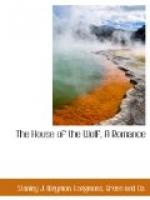How truly he spoke we know now. For two-and-twenty years after that twenty-fourth of August, 1572, the sword was scarcely laid aside in France for a single month. In the streets of Paris, at Arques, and Coutras, and Ivry, blood flowed like water that the blood of the St. Bartholomew might be forgotten—that blood which, by the grace of God, Navarre saw fall from the dice box on the eve of the massacre. The last of the Valois passed to the vaults of St. Denis: and a greater king, the first of all Frenchmen, alive or dead, the bravest, gayest, wisest of the land, succeeded him: yet even he had to fall by the knife, in a moment most unhappy for his country, before France, horror-stricken, put away the treachery and evil from her.
Talking with Louis as we rode, it was not unnatural—nay, it was the natural result of the situation—that I should avoid one subject. Yet that subject was the uppermost in my thoughts. What were the Vidame’s intentions? What was the meaning of this strange journey? What was to be Louis’ fate? I shrank with good reason from asking him these questions. There could be so little room for hope, even after that smile which I had seen Bezers smile, that I dared not dwell upon them. I should but torture him and myself.
So it was he who first spoke about it. Not at that time, but after sunset, when the dusk had fallen upon us, and found us still plodding southward with tired horses; a link outwardly like other links in the long chain of riders, toiling onwards. Then he said suddenly, “Do you know whither we are going, Anne?”
I started, and found myself struggling with a strange confusion before I could reply. “Home,” I suggested at random.
“Home? No. And yet nearly home. To Cahors,” he answered with an odd quietude. “Your home, my boy, I shall never see again, Nor Kit! Nor my own Kit!” It was the first time I had heard him call her by the fond name we used ourselves. And the pathos in his tone as of the past, not the present, as of pure memory—I was very thankful that I could not in the dusk see his face —shook my self-control. I wept. “Nay, my lad,” he went on, speaking softly and leaning from his saddle so that he could lay his hand on my shoulder “we are all men together. We must be brave. Tears cannot help us, so we should leave them to the— women.”
I cried more passionately at that. Indeed his own voice quavered over the last word. But in a moment he was talking to me coolly and quietly. I had muttered something to the effect that the Vidame would not dare—it would be too public.
“There is no question of daring in it,” he replied. “And the more public it is, the better he will like it. They have dared to take thousands of lives since yesterday. There is no one to call him to account since the king—our king forsooth!—has declared every Huguenot an outlaw, to be killed wherever he be met with. No, when Bezers disarmed me yonder,” he pointed as he spoke to his wound, “I looked of course for instant death. Anne! I saw blood in his eyes! But he did not strike.”




